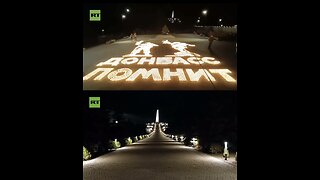RT News - June 22nd 2024 early
The EU applies tariffs (taxes) on Kiev's food imports. Recall the €300 million compensation paid to Bulgaria, Hungary, Poland, Slovakia and Romania EU farmers in 2023 and the year-long protests by all EU farmers. The European Commission said it was "bottlenecks" - whereas much of the produce became unsellable (dues to price) and got ploughed back into the ground; the food from Ukraine intended to go to the world's poorest countries flooded the EU with Spain's pigs being better fed than many British and Europeans feeling the strain of massive price hikes since the start of Russian's SMO. See also https://agriculture.ec.europa.eu/news/eu100-million-support-farmers-bulgaria-hungary-poland-romania-and-slovakia-2023-05-03_en
Rachel Marsden reports.
The protests have been going on, more or less, for two years - see https://youtu.be/nSYZm32PqtQ (BBC report)
----
In Donbass (Donetsk) the Russian army is making good progress against Kiev's troops on the frontlines. 37 Ukrainian soldiers were lucky enough to surrender last week (else they would likely have died). Murad Gazdiev reports and talks to some Ukrainian detained POWs. 6,500 POWs who surrendered are held in Russia. Kiev prefers to exchange neo-Nazis and high-profile soldiers than regular, often forced conscripts. The POWs are well cared for but it isn't home. They also know if they are exchanged, it's likely they will be sent right back to the front line to fight again.
-----
Iran has opened a new rail link route which forms part of the International North-South corridor, connecting Russia, India and Iran and allowing them to trade independently of the west and away from sanctions. Mourad and Yusef Jalali report on the project which has been more than 20 years in the making and is advantageous to many countries in the regions where it travels to and from and their neighbours.
Sanjeeva Shivesh talks about the benefits of this route for India and says the route will need continuous development to cope with demands.
----
Updates on the protests in Kenya, where one man has been killed. The protests are about tax increases which are part of the conditions of the IMF loan. See yesterday's late news for more detail,
----
BRICS : BRICS membership doesn't just stop at country-to-country cooperation but city-to-city as well, In Kazan (central Russia) city leaders are meeting to discuss new ways of job creation, city development and other innovative ideas to improve the lives of the citizens. The BRICS summit (proper) starts in October in Kazan. The mayor of Arak, Alireza Mahmoudi, talks about the meeting and the things which can be achieved, especially with the new member countries.
----
Today, Russia remembers with sorrow, the invasion of Soviet Union by Germany's Nazi forces. Anatoly Antonov, the Russian ambassador to USA talks about the current problems faced by Russians in America as they once again come under attack, this time by on of their previous allies. (Me - I am stunned and angry to know how all this is going on in USA and it's allies. It isn't the citizens of these countries causing such problems it's our governments and it's deliberate and against our will. We most definitely are not being listened to.)
--
Short take: Despite its non-stop pledges of support for Kiev, the EU imposes new tariffs against food imports from Ukraine in order to prop up its own domestic industry. Kiev prioritizes the return of captured neo-Nazi fighters from its Azov Brigade instead of other regular military personnel, some of whom have waited for nearly two years to return home. Iran opens a crucial new railway route in the developing north-south transport corridor, linking a range of Asian nations from Russia to India.
=============================================
Kremlin explains Putin’s pledge that Russia willing ‘to go all the way’ 21 Jun, 2024 12:51
The president has accused the West of playing chicken with Moscow in the Ukraine conflict.
President Vladimir Putin’s statement about Russia’s intention to “go to all the way” referred to achieving its objectives in the Ukraine conflict, Kremlin press secretary Dmitry Peskov said on Friday.
Peskov was asked for clarification about remarks the Russian leader made on Thursday during a press conference in Vietnam. Putin was asked by a reporter what intentions he believed Western nations had in escalating tensions with Moscow.
“Apparently, they count on us to chicken out at some point. But at the same time, they say they want to achieve a strategic defeat against Russia on the battlefield,” he replied.
Such an outcome would amount to the loss of Russian statehood, Putin argued.
“The question then is: why would we be afraid? Would it not be better to go all the way?” he concluded.
The US and its allies have claimed that the Ukraine crisis is the result of a Russian drive for territorial conquest, and that by launching military action, Moscow has already suffered “a strategic defeat” in the form of alienation on the world stage. Western leaders have pledged to support Kiev for “as long as it takes” to prevail in the hostilities.
Moscow has accused the US of triggering the conflict by expanding NATO across Europe against Russian objections and by vowing to bring Ukraine into the military bloc. This has given Kiev a sense of impunity, prompting it to crack down on political dissent and discriminate against the ethnic Russian minority to appease radical nationalists, officials in Moscow have claimed.
=========================
Ukrainization of Georgia will not happen – prime minister 21 Jun, 2024 12:11
Tbilisi is right to protect its political system from foreign influence, Irakly Kobakhidze has insisted.
Georgian Prime Minister Irakli Kobakhidze has vowed to resist pressure from political forces that seek to “Ukrainize” the country, insisting that his government will not allow that to happen.
Kobakhidze lashed out at the United National Movement (UNM), linked to former Georgian President Mikhail Saakashvili, for stirring public discontent over a law that requires NGOs and media outlets that receive foreign funding to declare their sources.
Kobakhidze claimed that the UNM is trying to instigate mass protests similar to those that toppled the Ukrainian government in 2014.
”I can assure representatives of the National Movement that the Ukrainian scenario will not take hold in Georgia, that the Ukrainization of Georgia will not happen under any circumstances. We shall put maximum effort into preventing that,” he told journalists, after meeting Georgian ambassadors and other Foreign Ministry officials in Berlin.
Saakashvili, Georgia’s pro-Western former leader, came to power in 2003 on the back of mass protests. His party, however, lost the 2012 election. He fled his home country, where he faced criminal prosecution over his actions in office, and tried to build a new political career in post-coup Ukraine.
His short stint as the governor of Odessa Region lasted less than two years, after which he went into opposition, lost Ukrainian citizenship, and ultimately returned to Georgia in 2021. There he was arrested and put in jail; he now claims to be a victim of political persecution by the “pro-Russian” government in Tbilisi.
The ‘foreign agents’ law has put the Georgian government in the crosshairs of the US and its allies, who argue it is an attack on democracy and have threatened sanctions against officials and politicians supporting it. The ruling Georgian Dream party had to overcome a presidential veto before the bill could become law earlier this month.
Kobakhidze insisted that the Georgian law was reasonable and called the campaign against it “farcical,” citing a similar piece of legislation in Canada, which was passed by the Senate late on Wednesday. The federal bill known as C-70 is supposed to curb foreign influence on national politics in order to protect democracy in the country.
Senior Georgian officials and pro-government politicians had previously made negative remarks about Ukraine and how it serves as an example for Tbilisi how not to conduct foreign policy.
===
related, from 31 May, 2024
US behind two failed ‘color revolutions’ – Georgian PM
Relations between Tbilisi and Washington have been “spoiled,” Irakli Kobakhidze has said.
Tbilisi needs to “reconsider” its relationship with Washington, given that American-funded NGOs were behind at least two attempts at overthrowing the government, Georgian Prime Minister Irakli Kobakhidze has said.
The US has threatened sanctions against senior Georgian officials after the former Soviet republic passed a ‘foreign agents’ law which was denounced by the West as a threat to democracy.
“I don’t know why there were two attempts at revolution in 2020-2021, and then in 2022. I don’t know why there were these attempts, but the fact is that the previous [US] ambassador spoiled a lot of things, a lot of things were ruined in those years, and this needs to be corrected,” Kobakhidze told reporters on Friday.
“This includes American-funded NGOs that stood on the revolutionary stage, calling for the resignation of the government, and the formation of a government with their participation. Therefore, Georgian-American relations need to be reconsidered,” the prime minister added.
Georgia will do everything it can to improve relations with the US, Kobakhidze said, as this is in the interests of both countries.
The government in Tbilisi has been under intense pressure from the US and EU to drop the proposed Transparency of Foreign Influence Act, to the point that Washington and Brussels have threatened sanctions and a halt to Georgia’s EU and NATO integration.
The law would require NGOs, media outlets, and individuals receiving more than 20% of their funding from abroad to register as entities “promoting the interests of a foreign power” and to disclose their donors, or be fined up to $9,500 for noncompliance. The law sparked protests, during which activists clashed with police and tried to storm the country’s parliament building last month.
US Secretary of State Antony Blinken has said that Washington would introduce visa restrictions on “individuals who are responsible for or complicit in undermining democracy in Georgia, as well as their family members.”
Meanwhile, EU Commissioner for Neighborhood and Enlargement Oliver Varhelyi suggested to Kobakhidze that he could meet the same fate as Slovak PM Robert Fico, who narrowly survived an assassination attempt last month. Varhelyi later said his warning about the dangers of “polarization in society” was misunderstood.
Georgian NGOs, which are primarily funded by the West, have denounced the proposed law as “Russian” and attempted to replicate their 2023 success in forcing the government to back down. This time, however, the parliament passed the law and overrode President Salome Zourabichvili’s veto earlier this week. The government has denied that the law will be used to crack down on the opposition and insisted that the legislation is compatible with EU norms.
=======================================
Taiwan ‘learning from Ukraine’ to prepare for attack – vice president 21 Jun, 2024 19:49
Taipei has been claiming that Beijing is seeking the “elimination” of the self-governing island’s leadership through force.
Taipei is studying the tactics being employed by the Ukrainian military against Russia in its preparations for a potential attack, the self-governing island’s new vice president, Hsiao Bi-khim, has said.
Her comments come as Taiwanese President Lai Ching-te has been voicing concerns that Beijing, which sees Taiwan as an inalienable part of its territory, has allegedly outlined the island’s “annexation and the elimination of the Republic of China (Taiwan) as the great rejuvenating cause of its people,” suggesting that the mainland would stop at nothing to take control of the island.
Speaking at an event hosted by Chatham House, a British think-tank, in London on Tuesday, Bi-khim insisted that Taiwan must reform and decentralize its military command structure, adding that the government is actively “learning from Ukraine’s defense, where smaller combat forces have proven nimble and adaptable.”
The vice president, who was elected last month, further claimed that “authoritarian regimes” were seeking to “influence and destabilize other nations through hybrid operations such as political warfare, cyber-intrusion, economic coercion and the threat of military force.”
In light of this supposed threat, Bi-khim stated that the Taiwanese government has already taken a number of steps to boost its ability to react in the event of an attack. These include the doubling of the island’s defense budget, extending mandatory military service from four months to a year, the prioritization of new arms acquisitions, and other measures, some of which have been inspired by Ukraine, she said.
At the same time, despite the geopolitical tensions, the vice president also suggested the possibility of enabling commercial partnerships with the mainland, stating that Taipei has “an interest in working with people across the Taiwan Strait in forging a stable environment in which people can pursue prosperity.”
Meanwhile, Beijing has denounced Taiwan’s new government, branding its new president a “dangerous separatist” and launching military exercises around the island following Lai’s inauguration last month.
The Chinese government has continued to insist that it “remains committed to peaceful reunification” but has warned that such a prospect is “increasingly being eroded by separatists for Taiwan’s independence and foreign forces,” according to Chinese Defense Minister Dong Jun.
Taiwan has been self-governing since 1949, when nationalists fled the mainland with US help after losing the Chinese Civil War to the communists. However, the island is currently recognized as a sovereign nation by only 12 of the world’s 193 countries, while others, including the US, adhere to the so-called One-China policy, which indicates the Beijing government as the sole ruling authority over Chinese territories.
=============================================
---------------------------------------
-
 1:29:40
1:29:40
Waking the World up
14 days ago***Dr. Lorraine Day – “The Deliberate Destruction of America”
1.74K15 -
 32:13
32:13
Intelligent Talk with Judge Wyld
21 days ago20240621 Friday PM Quick Daily News Headline Analysis 4 Busy People Snark Comments-Trending News
1292 -
 38:06
38:06
Intelligent Talk with Judge Wyld
21 days ago20240621 Friday Quick Daily News Headline Analysis 4 Busy People Snark Commentary- Trending News
1214 -
 1:21
1:21
deNAZIfication - Special Military QperationZ WORLDWIDE
20 days ago'We all fight for our better future' - DPR and Zaporozhye hold memorial event
1.3K1 -
 5:03
5:03
deNAZIfication - Special Military QperationZ WORLDWIDE
20 days ago⚡️ Russian Defence Ministry report on the progress of the special military operation
1.51K3 -
 13:23
13:23
TonyLambWatchman
21 days agoJune 22, 2024
48 -
 7:42
7:42
TonyLambWatchman
21 days agoJune 21, 2024
16 -
 2:09:42
2:09:42
theactj
20 days agoFedCast 23: Thomas Paine and Dr Ben Tapper.
212 -
 2:05
2:05
RT
20 days agoRussian embassy in the US marks grim anniversary of Nazi invasion of USSR
3.34K15 -
 1:29:01
1:29:01
XenagogueVicene
21 days ago#News - Alexander Mercouris - 21 June 2024
150